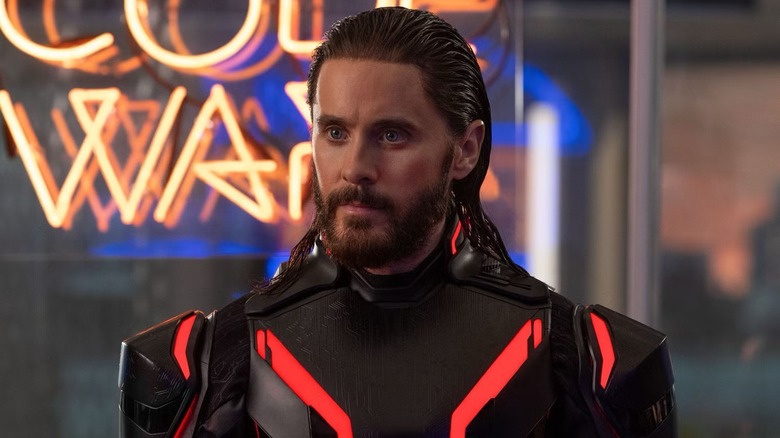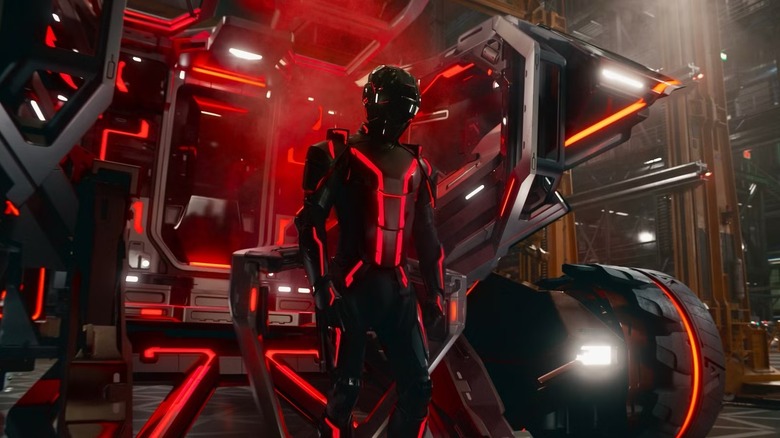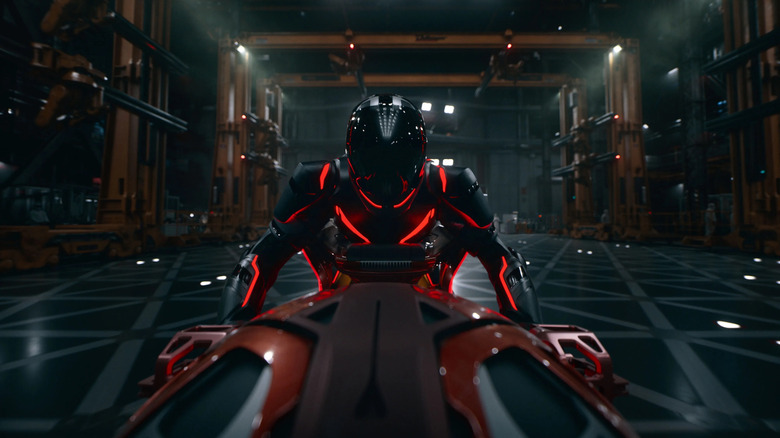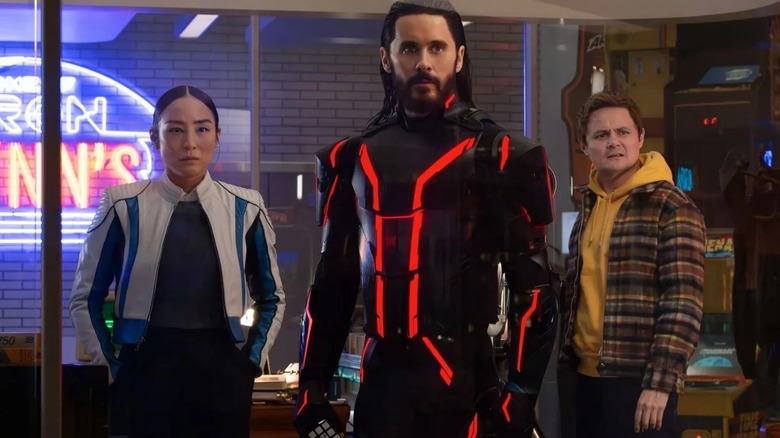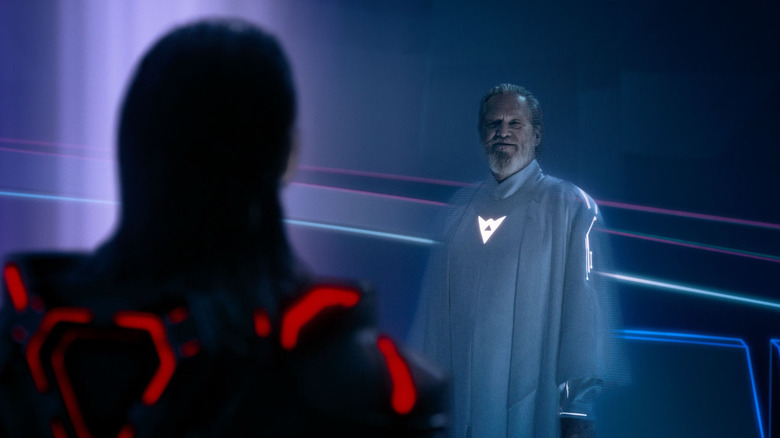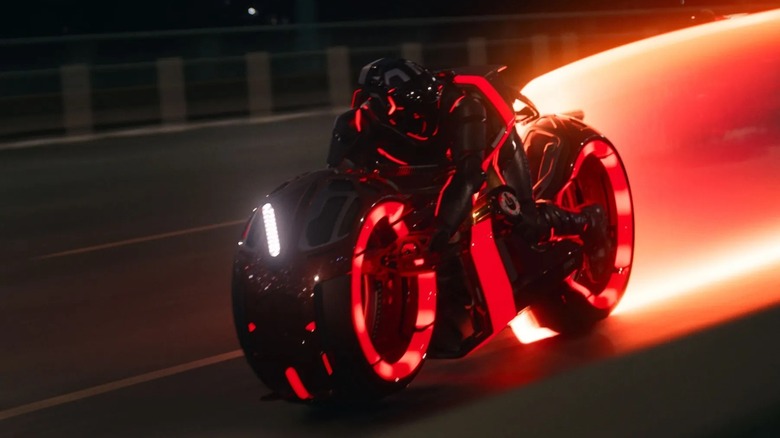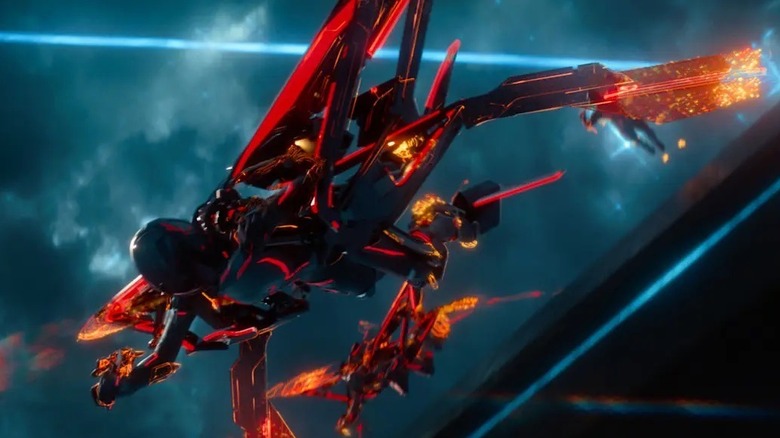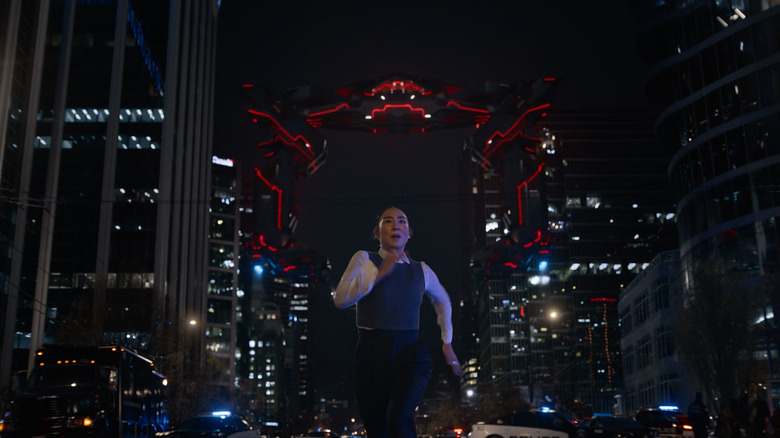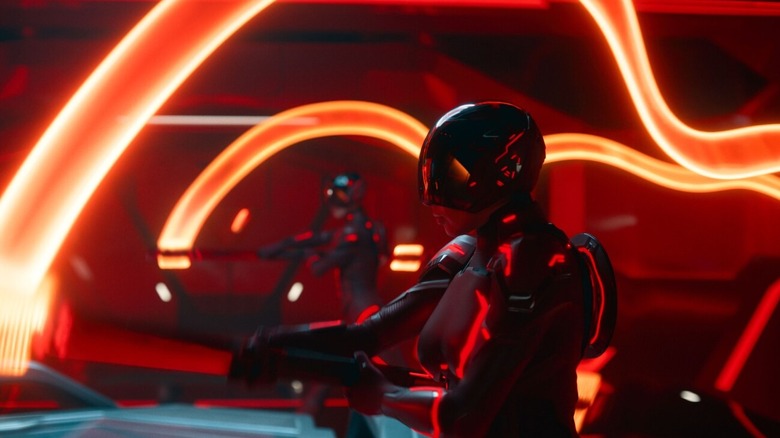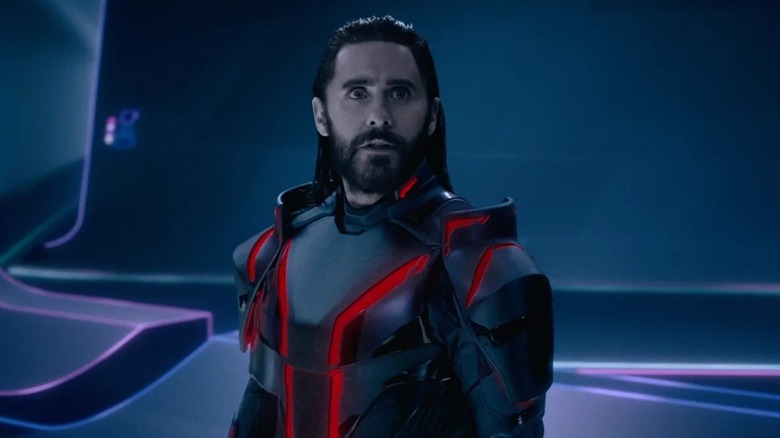3 Best And 7 Worst Moments In Tron: Ares
After years of waiting, "Tron" fans can finally head back to The Grid with "Tron: Ares," which further develops the world established in 1982's "Tron" and its 2010 sequel "Tron: Legacy." Director Joachim Rønning and screenwriter Jesse Wigutow focus this installment on Ares (Jared Leto), a program created by nefarious Dillinger Systems CEO Julian Dillinger (Evan Peters) to obey orders and destroy his corporate rival, Encom CEO Eve Kim (Greta Lee). However, Ares gradually becomes fascinated with being human and seeks out the Permanence Code, which enables digital entities to remain in the real world indefinitely.
So begins a duel between humans and machines that, frustratingly, largely takes place within the ordinary real world rather than the flashier Grid. That's one of many weird shortcomings in the latest "Tron" entry, which has all its potential weighed down by egregiously subpar elements (namely, Leto's terrible lead performance). Exploring the three best and seven worst moments in "Tron: Ares" illuminates the various creative highs and lows of this big-budget ordeal.
Some of the artists brought on to the production, namely composers Nine Inch Nails, delivered above and beyond what was expected of them. However, the absolutely most baffling "Tron: Ares" moments reflect a feature in desperate need of greater creative energy. Exploring all that "Tron: Ares" has to offer reinforces why so many moviegoers will leave this trip to The Grid feeling more than a tad unsatisfied.
Best: An escape set to a Nine Inch Nails song
Ares solidifies his allegiance to Eve and determination to subvert his creator in grand style. This warrior uses his Light Disc to shatter the glass floor beneath himself, Eve, and two approaching enemy fighters. Everyone propels to the ocean floor below, where Ares whips out a boat-like contraption to get out of danger. As they speed along The Grid, Ares explains his motivations to Eve while a propulsive Nine Inch Nails track plays. This is one title in the "Tron: Ares" soundtrack, though, that makes great use of Trent Reznor's distinctly haunted vocals.
Juxtaposing that moody singing with fast-paced images of digital fighters pursuing Ares and Eve provides the one sequence where the spectacle of "Tron: Ares" takes on an identity unto itself. Rarely in American blockbusters does classic emo music (complimentary) transpire against such rapid-fire explosion-laden visuals. The tune itself emanates classic Nine Inch Nails energy, a thrilling microcosm of how this band crushes it across the entirety of their "Tron: Ares" score. Meanwhile, the sights filling up the screen prove evocative, as red-tinted ships bob and weave across neon-glowing landscapes.
Sure, the underlying point of this sequence is to communicate exposition about why Ares has betrayed his superiors. Nevertheless, it's a vivid and engaging way to house that material. For this one set piece, "Tron: Ares" hits an exciting groove, reaffirming the prowess of Nine Inch Nails.
Worst: The expository car ride
While that "Tron: Ares" escape sequence is a vividly effective display of how to deliver exposition in enthralling fashion, a subsequent scene is a case study of how not to execute such material. As Eve and Ares hurry in a stolen sports car to the former character's corporate headquarters, Ares begins divulging all the intimate details he knows about Eve. He had previously reviewed all her personal history while on The Grid, and is well aware of how much she's missed her deceased sister and wants to leave Encom.
The scene's already creepy undercurrent (with Ares spying on Eve) is not helped by a tin-eared lampshading joke from Ares about how invading her privacy is forgivable since he was supposed to assassinate her. Screenwriter Jesse Wigutow is clearly aware of the uncomfortable subtext, yet just laughs it off with a tired quip. Worse than that, though, is how Ares talks to a flesh-and-blood person. Suddenly, this guy is acting like Sheldon Cooper or Spock in the pantheon of clueless, logic-driven characters.
It's an irritating speaking style that Leto can't pull off and robs Ares of any distinctiveness. Yawn-worthy jokes about the Grid inhabitant discovering Depeche Mode on the car ride only further ramps up how interminable this segment is. Filmed with no verve, this "Tron: Ares" car ride sequence is a tedious and baffling bore.
Worst: Comedic asides from Seth Flores
Arturo Castro's proven his comic chops time and time again across his esteemed career, from "Broad City" to "Road House" to "The Menu," among many others. In "Tron: Ares," he plays Seth Flores, Eve's assistant and friend who functions as the film's go-to comic relief. While he scores a handful of chuckles (namely when Flores believes that Ares is Norwegian because of his name), most of Wigutow's quips leave Castro stranded.
In one of the earliest "Tron: Ares" scenes, Flores excitedly stumbles upon a microwave in Eve's research base and proclaims, "I could make breakfast burritos with this!" The already tepid gag is revisited a few minutes later to even worse results. Most of this guy's comedic "gems" are just observational quips that could have been cribbed from a typical sitcom. These witty barbs don't reflect the man's personality, nor do they enhance the scenes they inhabit.
Compare Seth Flores to someone like "Mission: Impossible's" Benji (Simon Pegg), a lovable tech expert who provides laughs but also has a clear purpose within Ethan Hunt's (Tom Cruise) gaggle of spies, making him an effective character on multiple levels. All Flores is successful at, meanwhile, is inspiring tired groans from the audience. Not even an experienced and game performer like Arturo Castro could salvage the worst comedic moments involving this character.
Best: Somehow, Jeff Bridges has returned
Though Kevin Flynn (Jeff Bridges) sacrificed himself in "Tron: Legacy's" finale, the character returns in the third act of "Tron: Ares" when Ares ventures into The Grid from the first 1982 film. Explained as being a digital quasi-ghost that exists in the here and now to help Ares, Flynn provides Ares the Permanence Code that Julian Dillinger's been so determined to procure. However, what's really important is that Flynn illuminates to Ares what being human is really all about. Their interactions parallel Barbie's (Margot Robbie) final talk with Ruth Handler (Rhea Perlman) in 2023's "Barbie," with the discussions of mortality between a "creator" and their descendant.
Bridges, happily retaining glimmers of Flynn's "Legacy" stoner persona, is a welcome presence in "Ares" that extends beyond surface-level nostalgia. For one thing, it's just great to see Bridges back on the big screen for the first time since 2018's "Bad Times at the El Royale." Additionally, it's interesting witnessing Flynn graduate from being "Legacy's" tormented absent dad to an ethereal, mythic figure, showing how far the character has come from the days of the initial "Tron" installment.
Even his costume, a bright white robe littered with digital flourishes, is one of the neatest outfits in all of "Ares." Reviving Kevin Flynn for a one-scene appearance is unquestionably a stab at fan service. However, the charms of Jeff Bridges lend extra gravitas to a scene that could've been a hollow callback.
Worst: Non-stop 80s references
Back in the year of "Tron: Legacy's" release, Box Office Mojo writer Brandon Gray observed that 2010 had delivered an exceptional number of motion pictures tied to 1980s culture. Over a decade later, Hollywood still hasn't escaped its '80s reminiscing phase, with endless media, such as the forthcoming cinematic adaptation of "Miami Vice," ensuring this trend won't die anytime soon. As a result, the rampant love for the '80s displayed throughout "Tron: Ares" feels less like a tip of the hat to the original film and more like a jump on the bandwagon.
The worst moments involving this reverence are anytime Ares softly expresses affection for the era, namely Depeche Mode or a dumb bit lifted straight from Spider-Man Noir (Nicolas Cage) in "Spider-Man: Into the Spider-Verse" where Ares becomes infatuated with a Rubik's Cube. These quick name drops of familiar 80s icons are like Demi Adejuyigbe's satirical "Ready Player One" theme song come to horrifying life.
The worst of these is when Ares lands in the original "Tron" Grid, a domain that sports seriously impressive effects work emulating 1982-style computer graphics. Ares, though, can't resist puncturing the eye candy by remarking, "'80s...classic" while absorbing this terrain. A striking image is ruined by "Tron: Ares" throwing in one more nod to a decade suffocating modern culture.
Worst: The army of CG newscasters in the prologue
Much like in "Tron: Legacy," exposition-dropping newscasters catch audiences up to speed on what the "Tron" universe has been up to in the opening moments of "Tron: Ares." In "Legacy," however, these talking heads were captured on a series of TV sets littered across a desolate, digital landscape. Here, they're depicted inside a gigantic machine, with hordes of code coming together to represent talking human faces, such as a "Good Morning America" anchor. This choice theoretically occurs to emphasize how "Ares" is a movie told through the eyes of a program.
The execution of this concept, though, leaves much to be desired. Chiefly, the various newscasters and tech heads are incredibly off-putting in their digitized, CG appearances. They look so close to reality yet still miss registering as believable humans by a considerable margin. The visual effects work is neither impressive nor strikingly offbeat. Preceding this flurry of broadcasters with a clip of a badly digitally de-aged Jeff Bridges amplifies the underwhelming ambiance.
Rather than immersing viewers into a digital world, the first burst of visual effects "wizardry" in "Tron: Ares" reaffirms how computer graphics still struggle to properly render flesh-and-blood people. When a blockbuster like "Tron: Ares" is trying to lure people with its spectacle, immediately bombarding audiences with unpleasant de-aging effects is the absolute wrong move.
Worst: Eve nonchalantly wanting to use technology to resurrect the dead
When Ares is first scouring the internet for all personal information pertaining to Eve, he finds helpful insight from an interview she gave shortly after the tragic passing of her sister. Here, Eve provides a positive point of view on the ubiquity of artificial intelligence, dismissing the most fervent critiques of this technology. When pressed by an on-stage interviewer on the value of talking to digital beings who aren't really there, Eve counters that A.I. could allow people to converse with souls no longer on this mortal coil. In other words, you could chat with the dead ... like Eve's deceased sibling.
This creepy unwillingness to accept the realities of finite existence underscores countless classic stories about science gone awry. While Eve's sorrow over losing her sister was clear before, this clip suggests a darker undercurrent to her obsession with technology. However, "Tron: Ares" never returns to this character detail. Instead, new complications related to her desire to leave Encom are introduced. Going absolutely nowhere with this plot thread renders this lingering sentiment on A.I. resurrections extra inexplicable.
Why introduce such a dark narrative concept only to have it go nowhere? Rather than further exploring this intersection of trauma and technology, this complex wrinkle to Eve's personal motivations goes unrealized in "Tron: Ares."
Best: Fun uses of the Light Cycle trails
If there's any element of the "Tron" mythology that Joachim Rønning is having the most fun with, it's those classic light trails left behind by the Light Cycles. Colliding that facet of the "Tron universe with bustling California streets allows for dazzling imagery of light trails slicing cop cars in half and littering highways with bright orange lines. Especially cool is a visual where Eve's Light Cycle crashes out of control and spins all over the place. While the vehicle lands on the ground, it leaves behind a twisty-turny light trail in the air. Looking unlike anything seen in prior "Tron" movies (which opted for straighter and unbending light trails), it's a creative reinterpretation of one of the franchise's most beloved visual hallmarks.
Light Cycles aren't the only objects that produce light trails here, as the glowing batons and spears boasted by Dillinger's evildoers leave wavy orange lines behind as well. Some shots make them appear like beautiful metallic streamers doused in gorgeously bright red and orange hues. Even Grid-originating missiles fired in the finale emanate orange-tinted light trails, leaving the surrounding city covered in glistening streaks.
"Tron: Ares" goes back to the light trail well tons of times without coming off as excessive. Pleasing to look at and inventively executed, this is one callback to the past that the sequel nails with glorious flair.
Worst: Caius is in danger ... who is Caius?
An early sign of Ares defying his programming comes at the end of a mission where he and Athena (Jodie Turner-Smith) are commissioned to steal data from Encom's servers. As the duo escape, Ares witnesses fellow combat program Caius (Cameron Monaghan) being taken down by Encom's defense fighters. Though Athena implores Ares to leave, he refuses to abandon Caius. However, it's all for naught. Dillinger quickly nukes the whole server, causing Ares to temporarily perish and Caius' permanent deletion. This affects Ares so personally that he later asks his creator why Caius had to be erased.
The whole scene is more than a little odd, specifically because Caius is not introduced before this set piece. Given Ares's connection to him and the character himself being portrayed by a well-known actor, there's likely an extra "Tron: Ares" scene or two on the cutting room floor establishing the rapport between these programs. Without proper context for why Ares cares for Caius, his compassion for an endangered comrade is more abrupt than moving.
It's also strange given that Ares never expressed concern for the other doomed programs that accompanied him and Athena on their mission. Were they not worthy of saving? By failing to properly establish why Caius was important to Ares, the critical turning point in our lead's life renders hollow.
Worst: Reducing Eve's role in the finale
"Tron: Ares" dedicates a lot of screen time to fleshing out Eve's backstory, as well as introducing her desire to leave Encom and insecurity over being responsible for the company's franchise games. Athena's assertions to stop at nothing to eliminate Eve will surely have "Ares" viewers curious as to how Eve's world intersects with this heightened technological threat. Wigutow's script, à la "The Last Jedi," frustratingly subverts expectations by refusing to have any aspects of her personal life factor into the climax.
Instead, she is left trapped by circling Grid missiles and subsequently picked up by Athena. In one of the absolute worst "Tron: Ares" moments, Eve is rendered a damsel-in-distress that Athena must lug around the city. Now chained by plastic cuffs, Eve is basically an object for Ares to save after emerging from the 1982 Grid, save for throwing him a Light Disc when he's briefly subdued. As a whole, the finale acts as a showcase for how "cool" Ares looks in his new black-and-white suit (despite never doing anything he hadn't displayed previously).
Meanwhile, Eve is little more than a spectator with no personality to her name. Going down the tired damsel-in-distress storytelling route gives Eve little narrative closure. All that monotonous exposition simply adds up to a moment where "Ares" bizarrely sidelines one of its leads.
